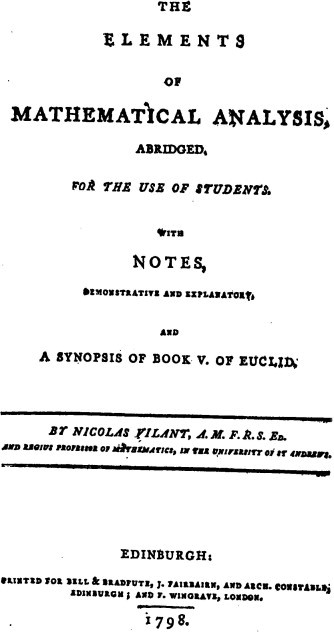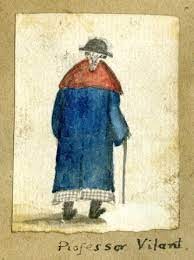Nicolas Vilant and Teaching at St Andrews in the late 1700’s
Nicolas Vilant served as Regius Professor of Mathematics at the University of St Andrews from 1765 to his death in 1807. Because of health problems, Vilant wasn’t able to teach and lecture for most of his tenure, so he relied on a number of assistants to teach in his stead.
Early Family Connections
Nicolas Vilant was born in Fife on 12 June 1737, not far from St Andrews. The Vilants had origins from France and maintained a close relationship with the University of St Andrews. Relatives had served in various roles in the local clergy and in the University, so Nicolas was easily able to follow in his family’s footsteps and begin studying maths at St Andrews in 1752. He graduated in 1756 and spent the next part of his life teaching at the prestigious Watt’s Academy in London, instructing young men on practical mathematics in preparation for military service. In 1765, Vilant returned home and was chosen to succeed David Gregory as Regius Professor, the chair of the St Andrews Mathematics Department, a historic position established in the seventeenth century by order of the royal crown. Because of his family connections with the University and impressive letters of recommendation from distinguished professors in Edinburgh and Glasgow, Vilant easily beat out four other candidates for the position.

Image credit: University of St Andrews Libraries and Museums.
Challenges in Teaching at St Andrews
Being a professor in St Andrews during the late 1700s meant having to deal with depleted funds and a shrinking town with poorer residents. St Salvator’s College and St Leonard’s College had been merged in 1747 in order to offset the loss of university funds. These conditions at the University made it difficult to teach effectively. As Regius Professor, Nicolas Vilant was able to defy the odds and successfully manage the mathematics department for almost forty years. While at St Andrews, Vilant married Elizabeth Brand and had two sons, who later studied at the University. In 1773, Vilant’s health seriously deteriorated, and he faced continued illness, including experiencing violent seizures. This condition confined Vilant to bed rest for the rest of his life.
Because he couldn’t actively teach and give lectures, Vilant employed a series of deputies to lead his courses. These assistants were all former university students and native to Fife. Vilant made sure to give part of his pay to each of his assistants throughout the years, who mostly conformed to Vilant’s wishes for the method and manner of how mathematics was taught. They used his textbook, Elements of Mathematical Analysis, and other standard reference books used in Britain for courses. Vilant was still able to personally guide the department through his assistants. The success of the department during his tenure is apparent when considering the accomplishments of the students at the time, many of whom would go on to be prominent scholars and researchers within mathematics and other fields in institutions around both Scotland and England.
While the deputies taught in his stead, Vilant spent much of his time enthusiastically reading on a wide range of subjects since little else was available due to his illness. Unable to attend any meetings for ordinary business of the University, Vilant was still able to prevent his colleagues from making the Regius Professor post a Joint Professorship and lower his pay. He called the notion a “clandestine and illegal resolution” and relied on his influence to dismiss the idea. Vilant’s successful time as head of the mathematics department would coincide with a “tradition of unusual mathematical excellence and ardour.”
The Elements of Mathematical Analysis
Nicolas Vilant completed only one major original writing; the full title is The Elements of Mathematical Analysis, abridged. For the use of Students. This work is functionally a textbook, and was used for decades at St Andrews after its completion in 1783. The Elements displays original conceptualization of various mathematical ideas, including standard algebra, quadratic and cubic equations, and arithmetic and geometric series. Vilant’s textbook is notable because it was the first English textbook to use “Mathematical Analysis” in its title. The Elements represents a standard developmental step in the British conceptualization of mathematics for the time. Vilant extensively outlines how continued arithmetic and geometric sequences can be applied for computing the interests of various money exchanges, including rents, annuities, and pensions. Despite this overview of mathematical analysis, Vilant is not a truly revolutionary figure and the work should be considered supplemental to his successful tenure as Regius Professor, in which he was able to overcome illness and broader inhibiting conditions for the University and guide the mathematics department for many decades.

Author
Josiah DeSarro-Raynal

